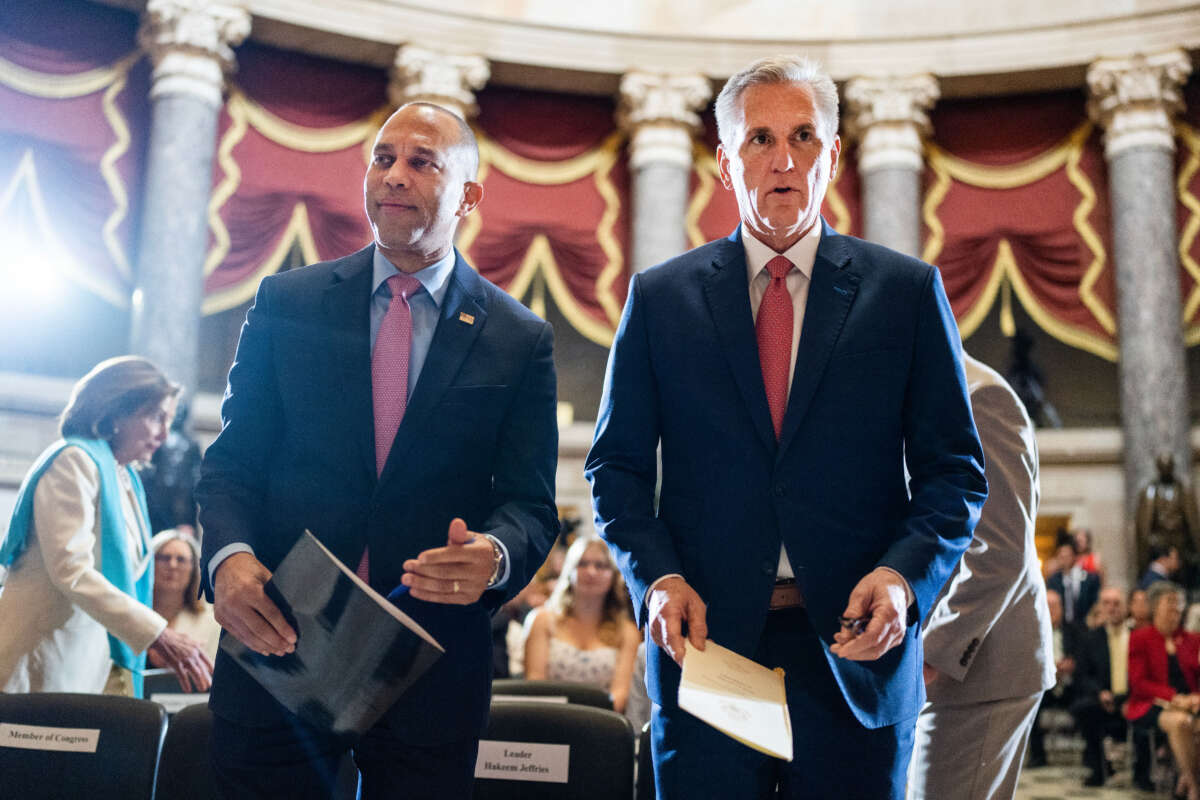Honest, paywall-free news is rare. Please support our boldly independent journalism with a donation of any size.
The U.S. House of Representatives will be up for grabs in the 2024 election due to a number of factors, including two recent court rulings.
Often overshadowed by the quadrennial presidential election, the House races will see each of the chamber’s 435 seats contested. However, due to gerrymandering and other political considerations, only a few of those races will be contentious.
Republicans currently control the House, winning by a razor-thin margin after a lackluster showing for the party in the 2022 midterms. To control the chamber, Democrats would have to flip a total of five GOP-held House seats while retaining all of the ones they currently hold, or win by a similar mathematical formula (like winning six seats while only losing one, etc.).
Several factors indicate that it’s highly possible Democrats could be successful in that regard.
For starters, former President Donald Trump is running for president again next year. As the likely GOP nominee, Trump’s presence on the ballot will likely galvanize a number of eligible voters to vote against him, as many did in the 2020 election who later sat out the midterms last year.
Another factor that could motivate more people to vote than did last fall is the issue of abortion rights. Six ballot measures were considered in as many states in 2022 regarding abortion rights, with voters taking a decisively pro-abortion stance, approving measures protecting the right in California, Michigan and Vermont and rejecting anti-abortion measures in Kentucky, Kansas and Montana.
Next year, at least two other states — New York and Maryland — will have an abortion rights vote. Four other states are also poised to put the issue of abortion on the ballot, likely producing a higher turnout than usual, as the vast majority of voters see abortion as a critical issue since the U.S. Supreme Court overturned federal abortion protections last year.
Since then, the issue of abortion has drawn higher turnout from Democratic voters than from Republican voters, and could tip the balance in the midterms for Democrats.
Two recent court rulings could also improve Democrats’ chances. The U.S. Supreme Court, in a somewhat surprising decision, ruled in favor of the Voting Rights Act last month, finding that Alabama had improperly diluted the votes of Black people in the state. The Court ordered Alabama officials to redraw the map, ensuring that another Black-majority district be created by next year’s midterm races.
The ruling will mean that Louisiana, which is embroiled in a similar lawsuit, will also likely have to redraw its maps to create another Black-majority district, producing two safe Democratic-leaning districts in the two states.
This week, a ruling in a New York-based court said that a previous ruling, which had benefited Republicans in the 2020 House races, was no longer necessary, and that congressional boundaries had to be redrawn before 2024. The court found that a temporary fix that was employed that year to draw maps had to return to “its constitutional design,” and ordered the Independent Redistricting Commission to redraw maps for 2024.
Republicans plan to appeal the ruling, but if allowed to stand, it could benefit Democrats by flipping around 3-4 seats in that state next year.
Finally, the number of vulnerable districts in the House also benefits Democrats. Around 18 GOP candidates are defending seats they won in 2020 in districts that were won by President Joe Biden, indicating those seats are potentially flippable. Conversely, Democrats are only defending five districts that Trump won that year.
These factors indicate that there is enough momentum for the Democratic Party to win the House, given the right conditions, in the next round of federal elections. Winning the House will be critical for the party, as their current control of the Senate might disappear next year.
According to the Cook Political Report, three Senate seats currently held by Democrats are rated as “toss-ups,” meaning there is an equal chance that a Republican or Democratic candidate will win them. Meanwhile, there are no toss-up seats for Republicans, according to their ratings, and the party is likely to hold all of its current seats.
Nationwide polling indicates both of the major political parties have equal shots at winning the House. An Economist/YouGov poll published this week, for example, shows that 42 percent of voters, at this time, would prefer to vote for a Democratic candidate in their House race, while 40 percent say they’d prefer the Republican choice — a split that’s within the poll’s margin of error. Thirteen percent of voters are still undecided.
Other polls are showing similar spreads. An Emerson College poll shows a tie between the two parties, while an NBC News poll from June shows Democrats up by two points as well.
A terrifying moment. We appeal for your support.
In the last weeks, we have witnessed an authoritarian assault on communities in Minnesota and across the nation.
The need for truthful, grassroots reporting is urgent at this cataclysmic historical moment. Yet, Trump-aligned billionaires and other allies have taken over many legacy media outlets — the culmination of a decades-long campaign to place control of the narrative into the hands of the political right.
We refuse to let Trump’s blatant propaganda machine go unchecked. Untethered to corporate ownership or advertisers, Truthout remains fearless in our reporting and our determination to use journalism as a tool for justice.
But we need your help just to fund our basic expenses. Over 80 percent of Truthout’s funding comes from small individual donations from our community of readers, and over a third of our total budget is supported by recurring monthly donors.
Truthout has launched a fundraiser to add 460 new monthly donors in the next 8 days. Whether you can make a small monthly donation or a larger one-time gift, Truthout only works with your support.
